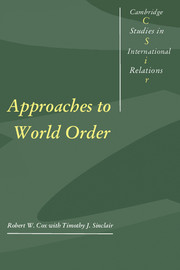Book contents
- Frontmatter
- Contents
- Preface
- Acknowledgements
- Part I Overviews
- Part II Theory
- 3 The idea of international labor regulation (1953)
- 4 Realism, positivism, and historicism (1985)
- 5 On thinking about future world order (1976)
- 6 Social forces, states, and world orders: beyond international relations theory (1981)
- 7 Gramsci, hegemony, and international relations: an essay in method (1983)
- 8 Towards a posthegemonic conceptualization of world order: reflections on the relevancy of Ibn Khaldun (1992)
- 9 “Take six eggs”: theory, finance, and the real economy in the work of Susan Strange (1992)
- Part III Interpretations
- Part IV Multilateralism
- Complete bibliography of works by Robert W. Cox to 1995
- Index of names
- Index of subjects
- CAMBRIDGE STUDIES IN INTERNATIONAL RELATIONS
8 - Towards a posthegemonic conceptualization of world order: reflections on the relevancy of Ibn Khaldun (1992)
Published online by Cambridge University Press: 05 June 2012
- Frontmatter
- Contents
- Preface
- Acknowledgements
- Part I Overviews
- Part II Theory
- 3 The idea of international labor regulation (1953)
- 4 Realism, positivism, and historicism (1985)
- 5 On thinking about future world order (1976)
- 6 Social forces, states, and world orders: beyond international relations theory (1981)
- 7 Gramsci, hegemony, and international relations: an essay in method (1983)
- 8 Towards a posthegemonic conceptualization of world order: reflections on the relevancy of Ibn Khaldun (1992)
- 9 “Take six eggs”: theory, finance, and the real economy in the work of Susan Strange (1992)
- Part III Interpretations
- Part IV Multilateralism
- Complete bibliography of works by Robert W. Cox to 1995
- Index of names
- Index of subjects
- CAMBRIDGE STUDIES IN INTERNATIONAL RELATIONS
Summary
In the beginning was the Word.
John 1.1When there is a general change of conditions, it is as if the entire creation had changed and the whole world been altered, as if it were a new and repeated creation, a world brought into existence anew.
Ibn Khaldun, The MuqaddimahOntology lies at the beginning of any enquiry. We cannot define a problem in global politics without presupposing a certain basic structure consisting of the significant kinds of entities involved and the form of significant relationships among them. We think, for example, about a system whose basic entities are states and of an hypothesized mechanism called the balance of power through which their relationships may be understood to constitute a certain kind of world order. From such ontological beginnings, complex theories have been built and specific cases – particular inter-state relationships – can be examined. There is always an ontological starting point.
Any such ontological standpoint is open to question. All of the terms just used have ontological meanings: global politics, structure, system, states, balance of power, world order. I choose “global politics” deliberately to avoid certain ontological presuppositions inherent in other terms such as “international relations,” which seems to equate nation with state and to define the field as limited to the interactions among states; or “world system,” which has been given a specific meaning by certain writers, notably by Immanuel Wallerstein.
- Type
- Chapter
- Information
- Approaches to World Order , pp. 144 - 173Publisher: Cambridge University PressPrint publication year: 1996
- 15
- Cited by

